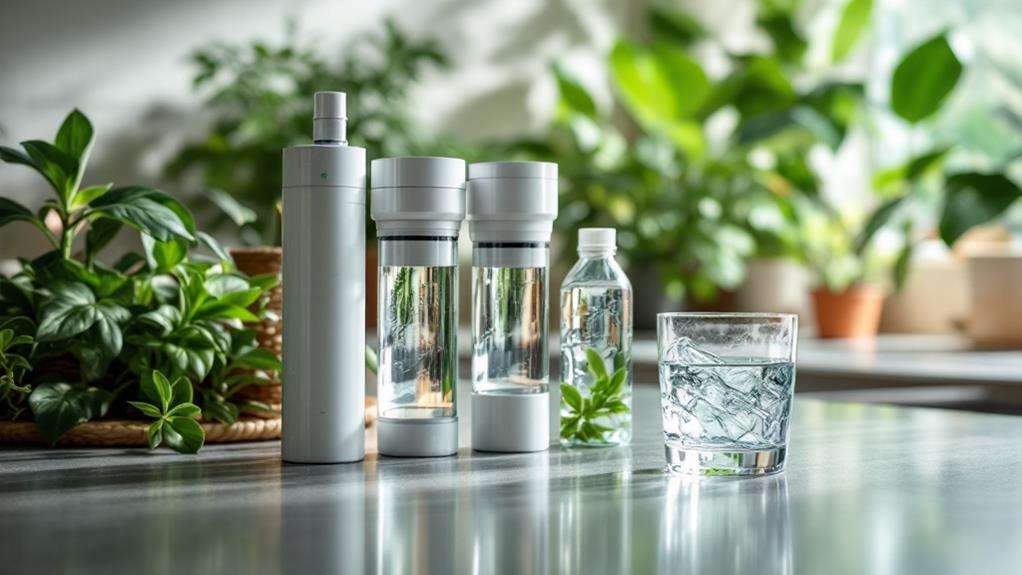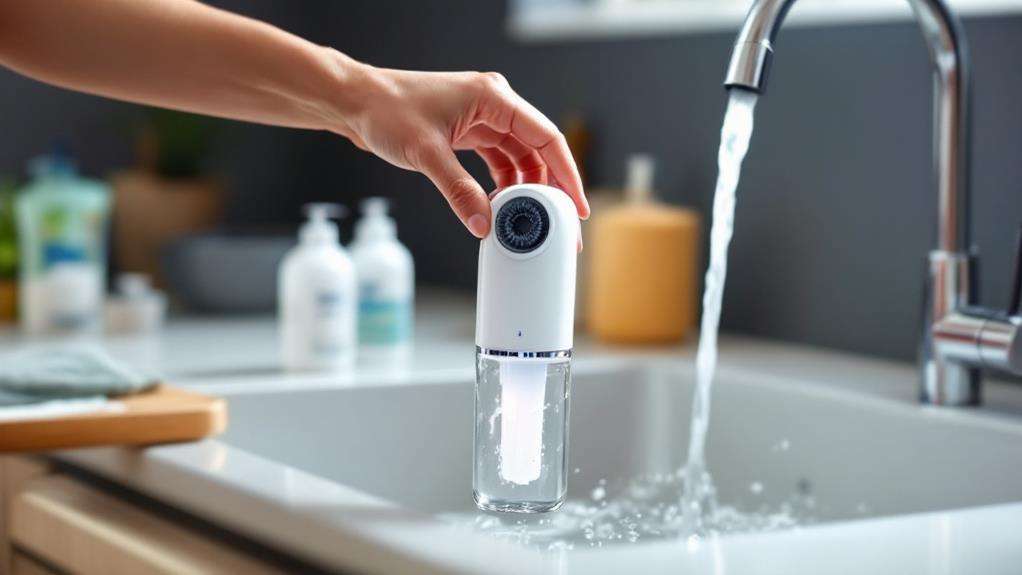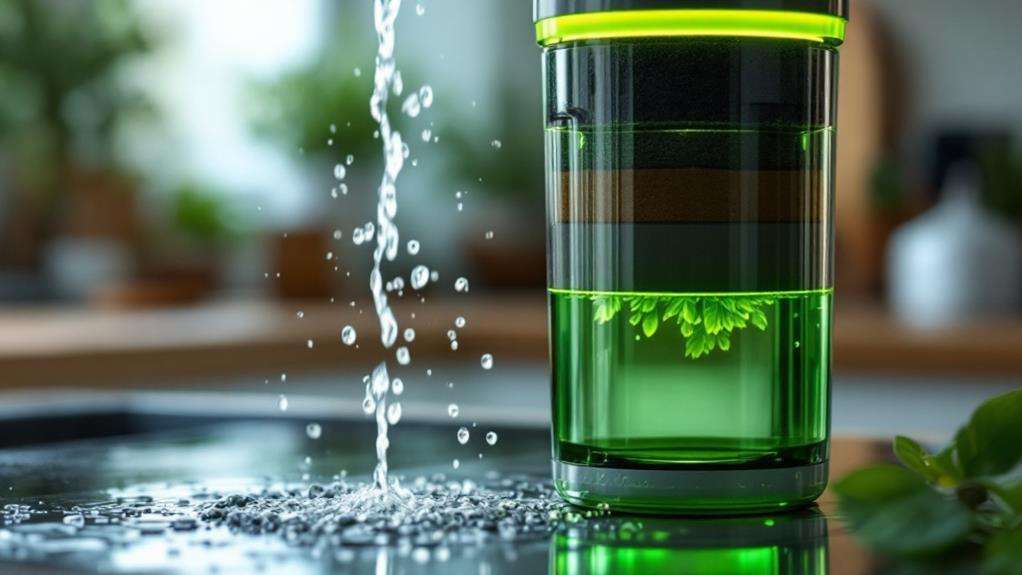Eco-Friendly Water Filtration Systems: A Guide for Sustainable Homes
Eco-friendly water filtration systems offer sustainable homes a way to purify water while minimizing environmental impact. You'll find options like activated carbon filters made from renewable materials, ceramic filters using natural media, and UV purification systems that don't use chemicals. These methods effectively remove contaminants, improve taste, and protect your health without wasting excessive water or energy. When choosing a system, consider your home's specific water quality and your sustainability goals. Regular maintenance guarantees ideal performance and longevity. By selecting the right eco-friendly filtration system, you'll enjoy clean water while reducing your environmental footprint. Uncover how these innovative technologies can alter your home's water supply.
Understanding Sustainable Water Filtration
To comprehend sustainable water filtration, investigating eco-friendly techniques that efficiently purify water while reducing environmental impact is essential. You'll find several methods that align with sustainability goals, each offering unique benefits.
Activated carbon filters, often made from renewable materials like wood or coconut shells, effectively trap impurities such as sediments, chlorine, and heavy metals. This sustainable option replaces plastics and can be crafted from recycled wood, making it an environmentally friendly choice.
Ceramic filters employ natural ceramic media to remove bacteria and sediments through tiny pores. This method is sustainable as it uses natural materials and minimizes waste. Similarly, ultraviolet (UV) purification offers an eco-friendly solution by rendering microorganisms inactive without producing wastewater or using chemicals.
Ultrafiltration and charcoal filtration are also remarkable sustainable options. Ultrafiltration uses membrane filters to remove various impurities without chemicals, while charcoal filtration adsorbs toxins using sustainably sourced wood materials that can be recycled.
Environmental Impact of Filtration Methods
The environmental footprint of water filtration methods varies considerably, depending on factors like energy consumption, waste production, and resource utilization. When choosing eco-friendly water filtration systems, you'll want to evaluate their long-term environmental impact.
Reverse osmosis systems, while effective, can waste significant amounts of water during filtration, making them less sustainable. In contrast, activated carbon and ceramic filters have a lower environmental impact over time, as they use more sustainable materials and generate less waste than pitcher filter replacements.
UV light filters don't produce physical waste, but their energy consumption contributes to their environmental footprint. If you're looking for a minimal impact option, gravity-fed filters are an excellent choice. They don't require electricity and have reusable components, reducing waste.
It's important to note that traditional water treatment processes are energy-intensive and produce hazardous byproducts, posing significant environmental challenges. By choosing eco-friendly water filtration systems for your home, you're not only ensuring clean water but also contributing to a more sustainable future. Evaluate the long-term environmental impact of your chosen filtration method to make the most responsible decision.
Types of Eco-Friendly Filters

Now that you understand the environmental impact of various filtration methods, let's investigate some specific types of eco-friendly filters. These sustainable options offer effective water purification while minimizing environmental harm:
- Ultrafiltration systems
- Ceramic water filters
- Ultraviolet purification
- Activated carbon and charcoal filters
Ultrafiltration uses membrane filters to remove impurities without chemicals and with lower energy consumption. It's an efficient approach for eliminating silt, sediments, bacteria, viruses, and proteins from your water supply.
Ceramic water filters leverage natural ceramic media with minute pores to remove most sediments and bacteria. They're a sustainable and environmentally friendly solution for your home's water filtration needs.
Ultraviolet purification systems inactivate microorganisms without producing wastewater or using harmful chemicals. This eco-friendly method guarantees clean water without compromising the environment.
Activated carbon filters and charcoal water filters are both sustainable options made from renewable materials. These filters effectively remove a wide range of contaminants through adsorption. You'll find activated carbon filters made from wood, nut shells, bamboo, or coconut shells, while charcoal filters use sustainably sourced wood materials. Both options are reusable and provide simple yet effective water purification for your home.
Assessing Your Home's Water Quality
Before you can choose the most suitable eco-friendly filtration system for your home, it is vital to assess your water quality. Water testing kits are readily available and can help you identify common pollutants like lead, arsenic, pesticides, and E. coli bacteria in your home's water supply. These kits provide a good starting point for understanding your water composition.
For a more thorough analysis, consider hiring professionals to determine Total Dissolved Solids (TDS), hardness levels, pH, and other chemical contaminants. This exhaustive assessment will give you a clearer picture of your water's overall quality and help you make informed decisions about filtration needs.
It's important to note that water quality issues can vary considerably by location. Understanding your local water composition is essential for selecting the right filtration system that aligns with your environmental sustainability goals. Even if you're on municipal water, chlorination used for disinfection can pose health concerns, making self-assessment crucial.
To maintain ideal water quality and ensure your filtration system remains effective, experts recommend regular testing every couple of years. This practice allows you to monitor changes in your water quality over time and adjust your filtration methods accordingly.
Choosing the Right System

After evaluating your home's water quality, it's time to select the most suitable eco-friendly filtration system. Consider factors like household size, budget, and environmental impact alongside water quality when making your choice. Activated carbon filters offer a sustainable option for many homes, effectively removing common contaminants while minimizing resource use. For more thorough filtration, reverse osmosis systems provide excellent purification but may have a larger environmental footprint.
When choosing your eco-friendly water filtration system, keep these key points in mind:
- Ceramic filters: Reliable bacteria and sediment removal with minimal waste
- UV purification: Chemical-free disinfection for effective water treatment
- Gravity-fed filters: Simple, low-maintenance option with a small environmental impact
- Multi-stage filtration: Maximizes water use and minimizes waste
Consider the long-term costs, maintenance requirements, and sustainability credentials of each filter type. Ceramic and gravity-fed filters are often more eco-friendly choices, while UV purification and multi-stage systems offer advanced treatment options. By carefully considering these factors, you'll be able to select a filtration system that aligns with your household's needs and environmental values, ensuring both effective water purification and a commitment to sustainability.
Installation and Setup Process
The installation process for eco-friendly water filtration systems varies depending on the type you've chosen. While gravity-fed or countertop filters are relatively straightforward to set up, whole-home systems and reverse osmosis units often require professional competence. If you're installing a whole-home system, you'll need to place it near the main water inlet. Point-of-use filters, on the other hand, can be installed under sinks or at specific taps.
For more complex water filtration systems, you'll likely need to connect tubing, secure filter housings, and guarantee proper sealing to prevent leaks. It's indispensable to follow manufacturer instructions carefully and consider hiring a professional for proper sizing, placement, and integration with your existing plumbing.
Once your system is installed, don't forget about maintenance. Regular filter replacements are essential for ideal performance and efficiency. Set prompts to change filters according to the manufacturer's recommendations, and periodically check for any signs of wear or leaks. By properly installing and maintaining your eco-friendly water filtration system, you'll ensure clean, sustainable water for your home while minimizing environmental impact.
Maintenance for Optimal Performance

Proper maintenance is key to ensuring your eco-friendly water filtration system continues to perform ideally. By following the manufacturer's guidelines and keeping a close eye on your system's performance, you'll maximize its efficiency and lifespan.
To maintain your eco-friendly water filtration system:
- Clean or replace filters regularly
- Monitor flow rates and water pressure
- Keep detailed maintenance records
- Regenerate reusable filters as needed
Don't neglect your system's upkeep. Regularly clean or replace filter components to keep your eco-friendly filtration system operating at peak efficiency. Follow the manufacturer's recommended replacement schedules for filters and other consumable parts to maintain consistent performance and water quality.
Stay vigilant by monitoring flow rates, water pressure, and overall system functionality. These indicators can help you identify when maintenance or repairs are needed, preventing system degradation. For reusable filters like ceramic and activated carbon, perform periodic cleaning or regeneration to remove accumulated contaminants and restore filtration capacity.
Lastly, maintain detailed records of your maintenance activities and filter replacements. This practice will help you plan for future system upkeep and budget accordingly, ensuring your eco-friendly water filtration system remains a sustainable solution for your home.
Cost-Benefit Analysis of Sustainable Filters
Evaluating the cost-benefit ratio of sustainable filters is essential when choosing an eco-friendly water filtration system. You'll want to review both upfront costs and long-term expenses to make an informed decision.
Activated carbon filters offer a lower long-term cost compared to pitcher replacements, making them an attractive option for budget-conscious consumers. If you're willing to invest more initially, reverse osmosis systems can provide significant savings over time, despite their higher upfront cost. These eco-friendly systems are particularly efficient for households with high water consumption.
Ceramic filters strike a balance between moderate initial costs and durability. Their reusability makes them a cost-effective choice for sustainable homes. UV light filters, while effective, require electricity, which adds to their operating costs. You'll need to factor in this ongoing expense when contemplating their overall value.
For those seeking minimal initial and ongoing expenses, gravity-fed filters are an excellent option. These water filtration systems offer a low-cost entry point into sustainable filtration. When examining the cost-benefit of different filters, consider your household's water usage, budget constraints, and long-term environmental impact to find the most suitable eco-friendly solution for your needs.
Innovations in Green Filtration Technology

Advanced innovations in green filtration technology are revolutionizing how we purify water sustainably. You'll find a range of eco-friendly options that don't compromise on effectiveness. Ultrafiltration systems use membrane filters to remove impurities without chemicals, while ceramic filtration harnesses natural media to filter out bacteria and sediments.
- Activated carbon filtration
- Ultraviolet water purification
- Ceramic water filtration systems
- Charcoal water filtration
Activated carbon filtration, made from renewable materials like wood and coconut shells, can adsorb a wide range of contaminants. It's an excellent choice for removing sediments, chlorine, pesticides, and heavy metals from your water supply.
Ultraviolet water purification offers a chemical-free solution that renders microorganisms inactive, ensuring your water is safe to drink without creating waste. Ceramic water filtration systems effectively filter out bacteria and sediments without electricity, making them ideal for off-grid living.
These innovations in green filtration technology provide you with sustainable options that are both effective and environmentally friendly. By choosing these eco-conscious solutions, you're not only ensuring clean water for your household but also contributing to a greener future.
Health Benefits of Clean Water
Clean water is a cornerstone of good health, and its benefits extend far beyond quenching your thirst. By investing in water filtration systems, you're taking a proactive step to safeguard your family's well-being. These systems effectively remove harmful contaminants, heavy metals, and bacteria that may lurk in your tap water, greatly reducing health risks associated with long-term exposure.
When you drink clean, filtered water, you're not only ensuring better hydration but also protecting yourself from potential health issues caused by chlorine, lead, and other chemicals. This is especially vital for children, whose developing bodies are more susceptible to the effects of water pollutants. You'll likely notice that filtered water tastes and smells better, encouraging you and your family to drink more water throughout the day.
